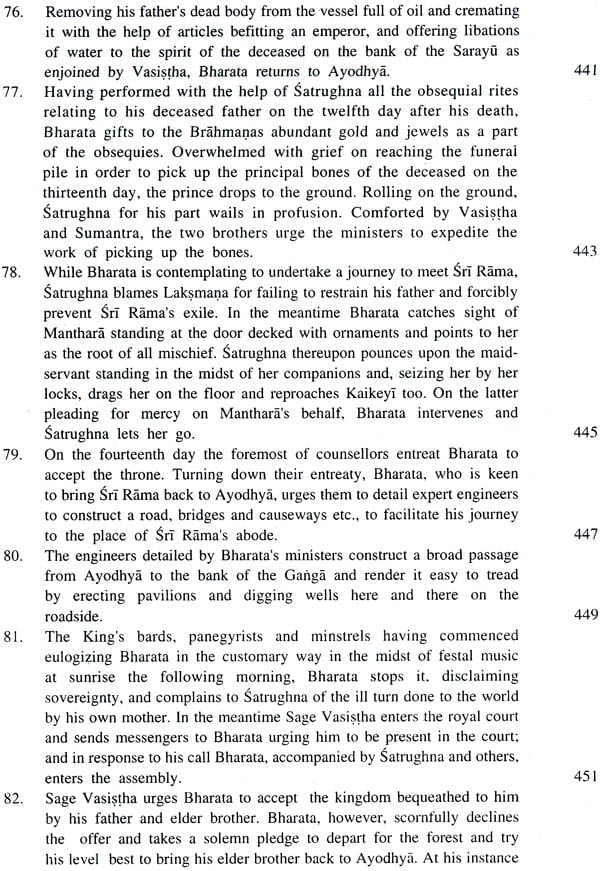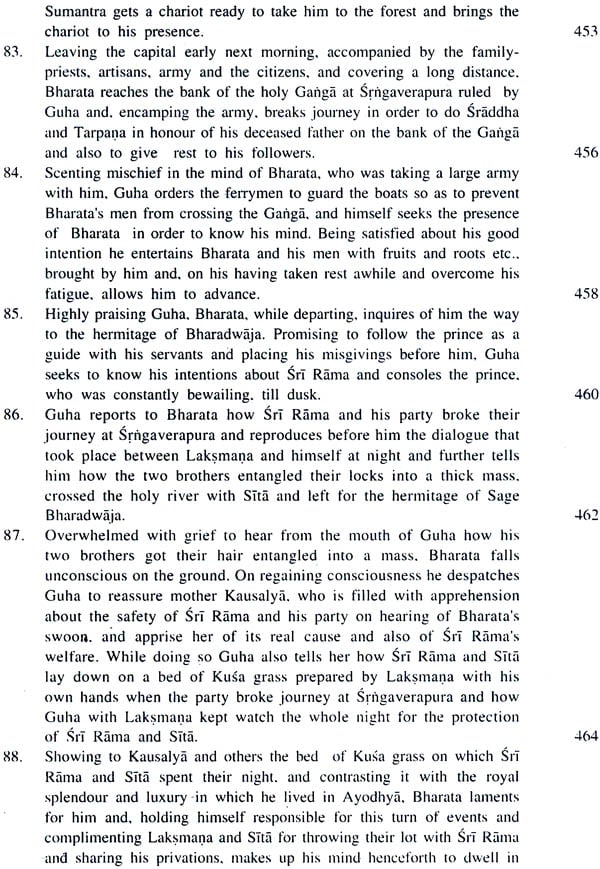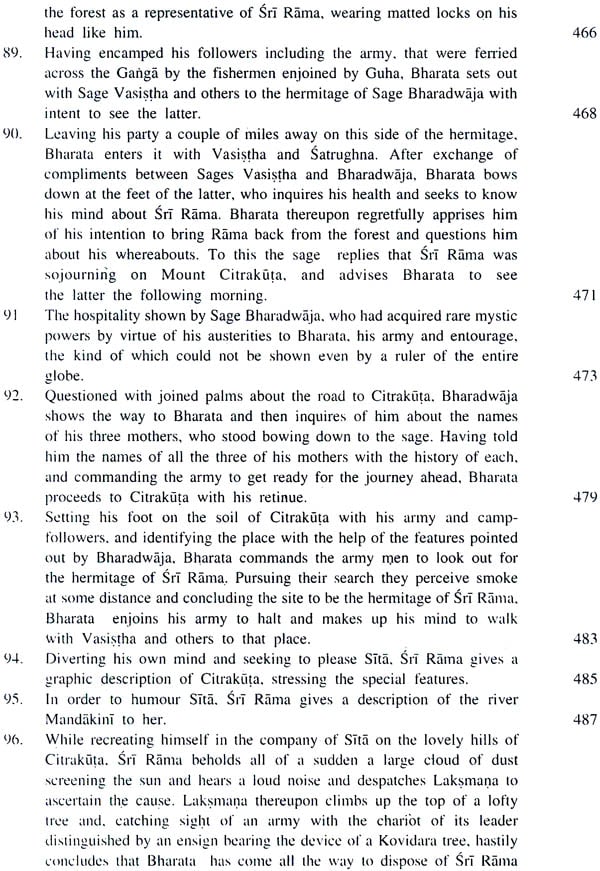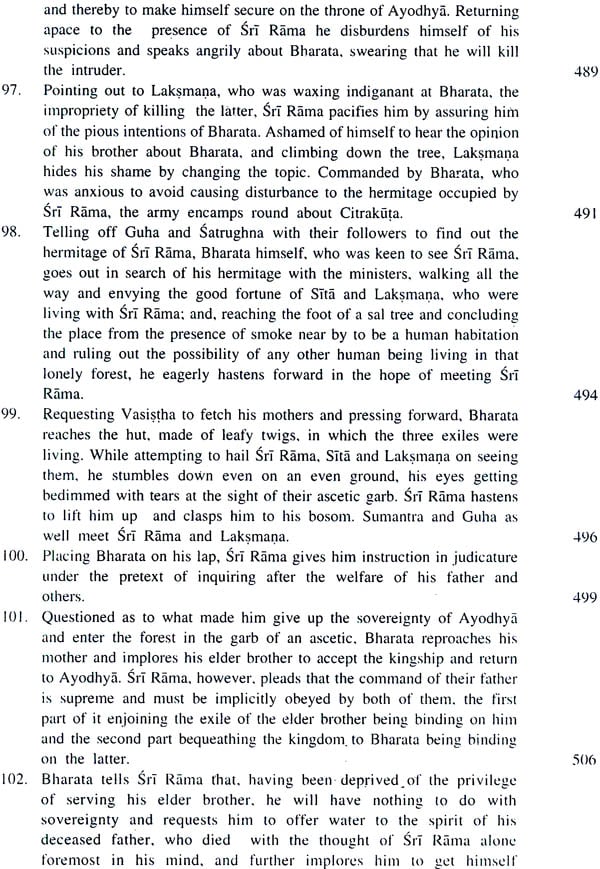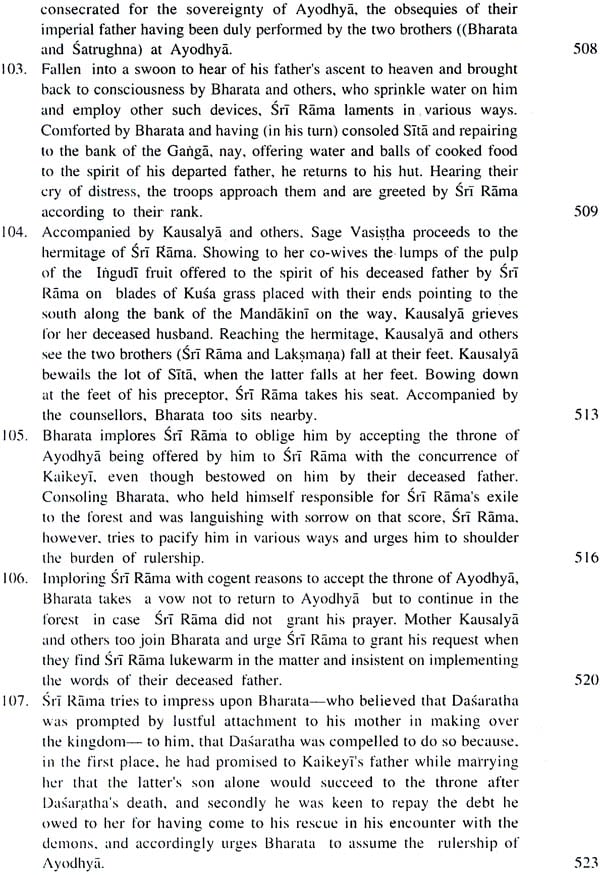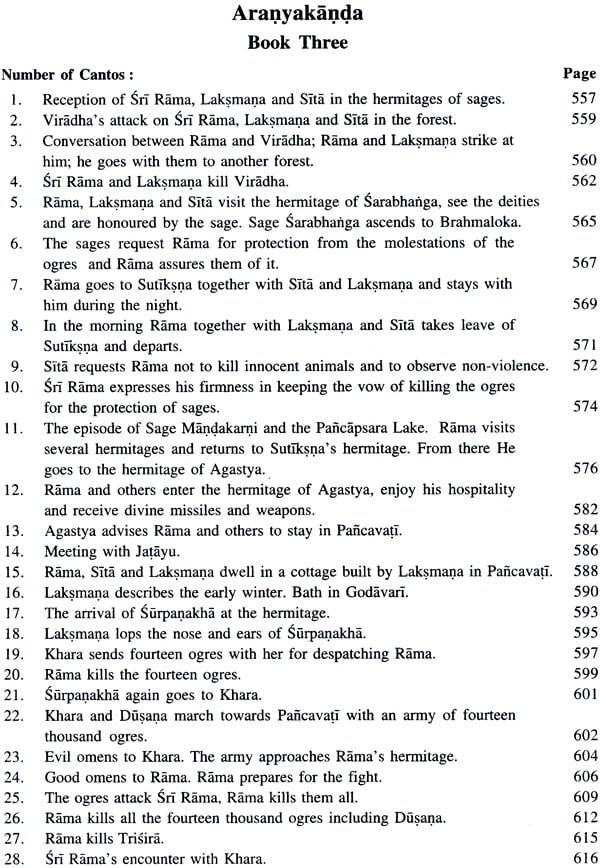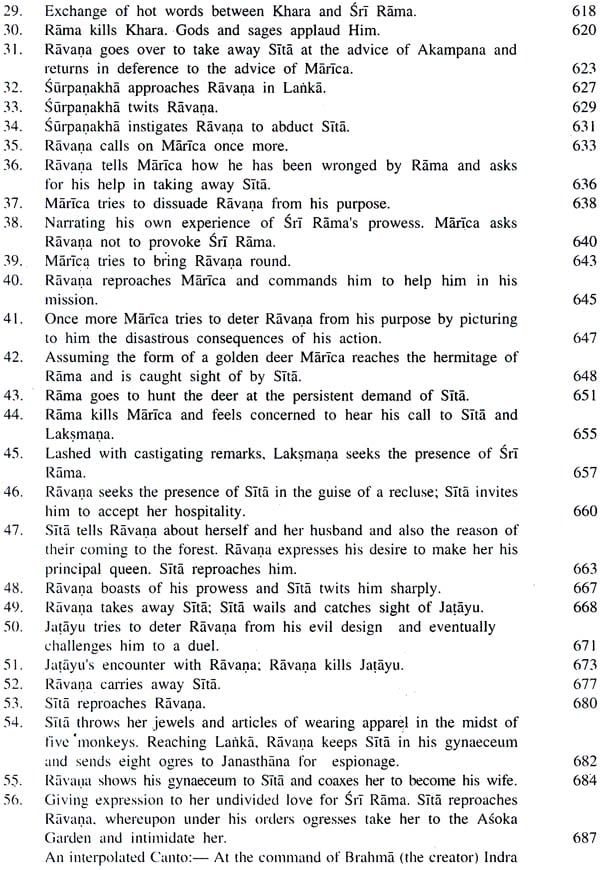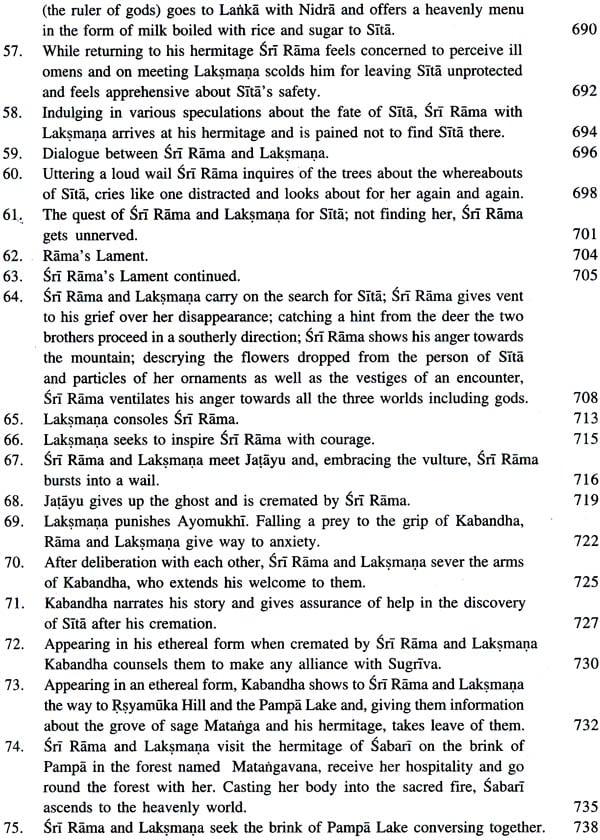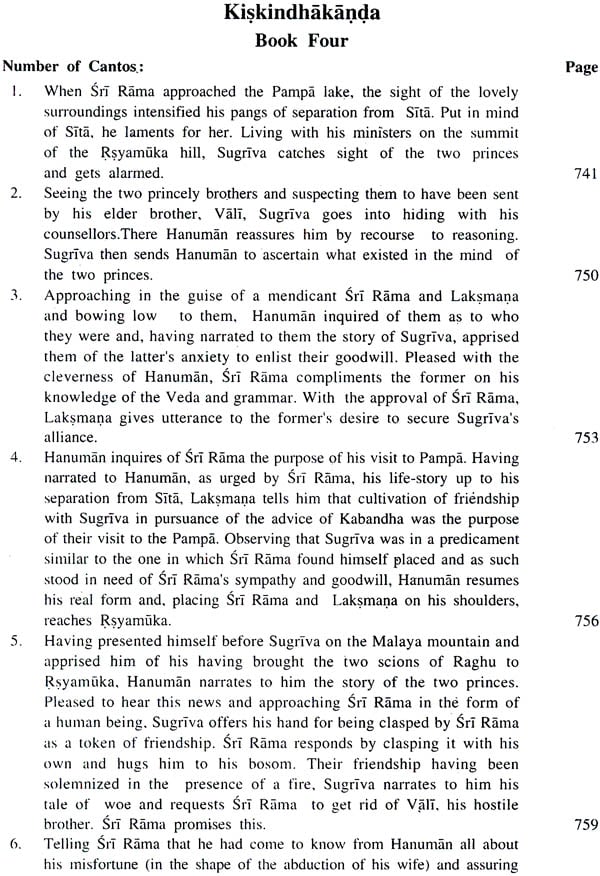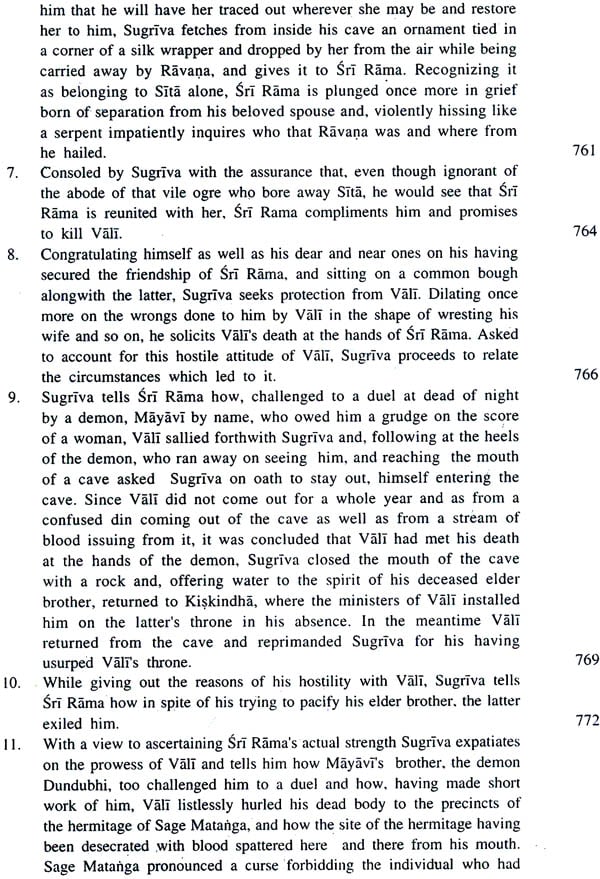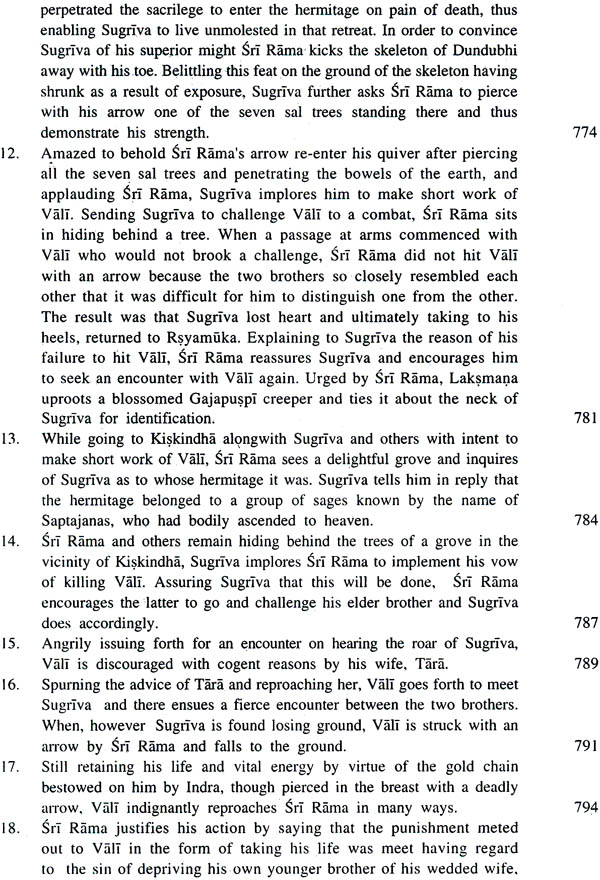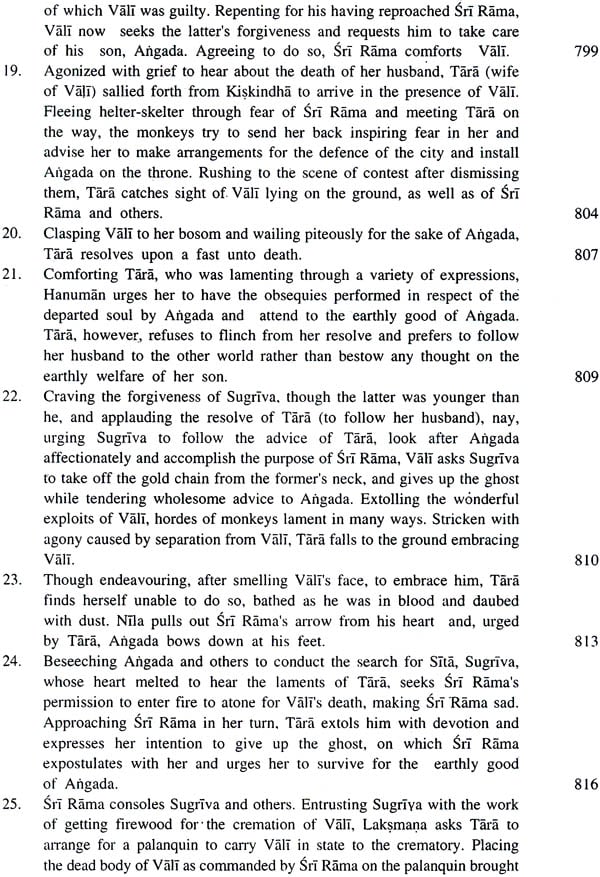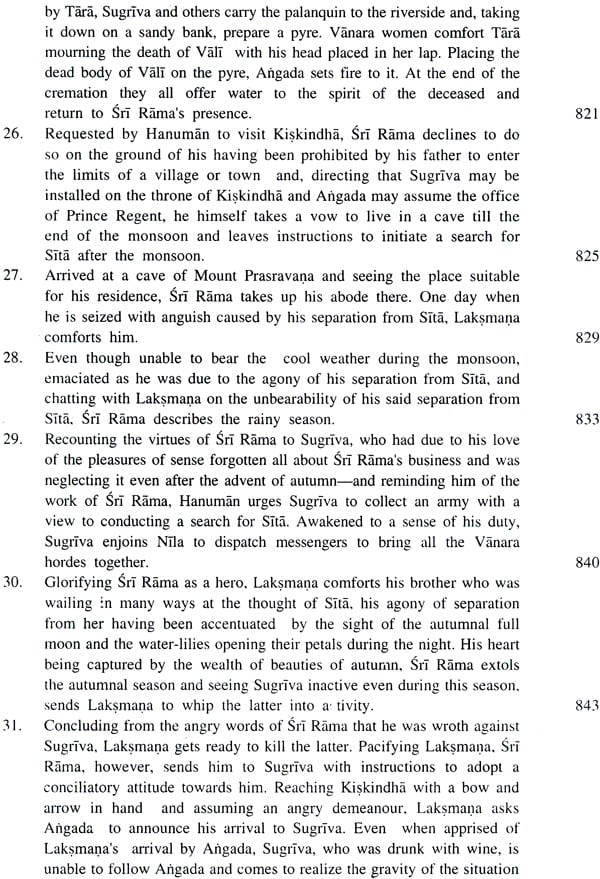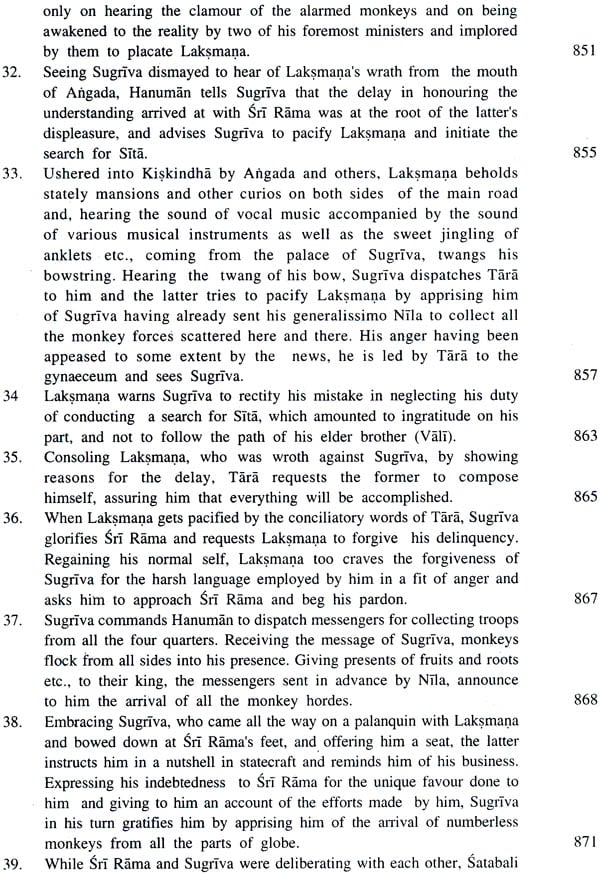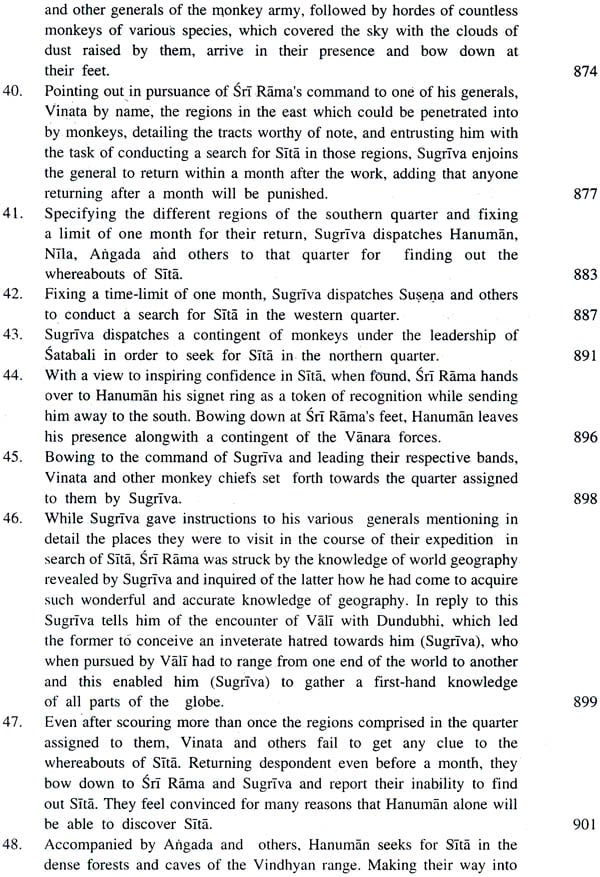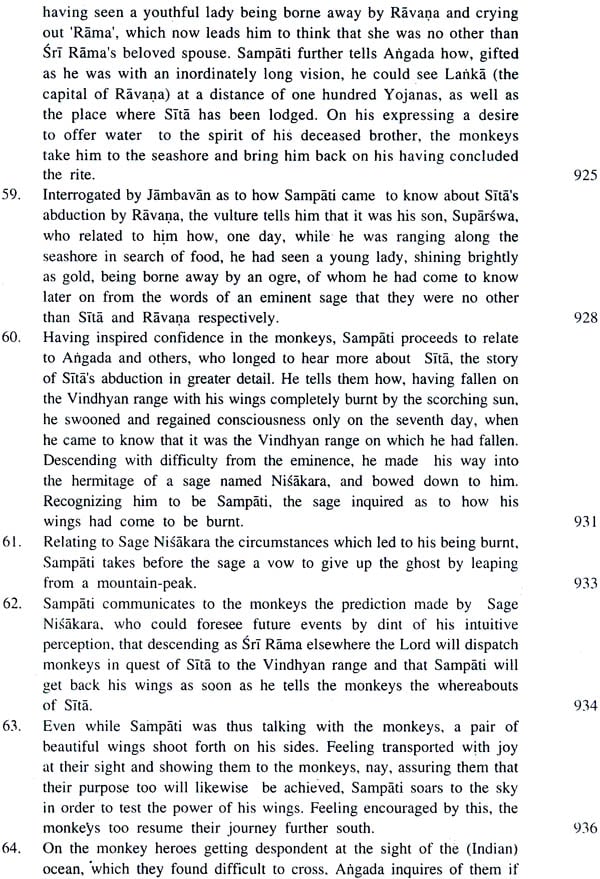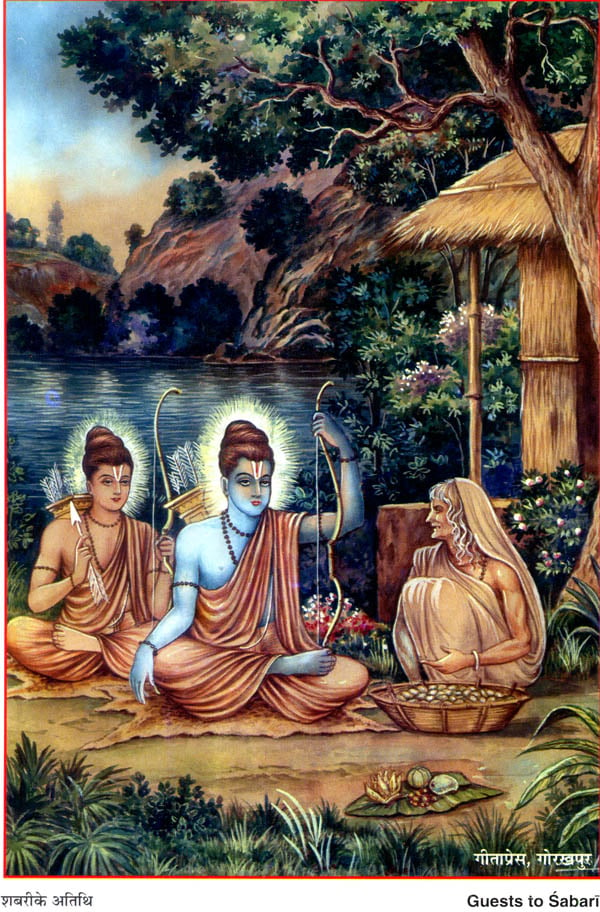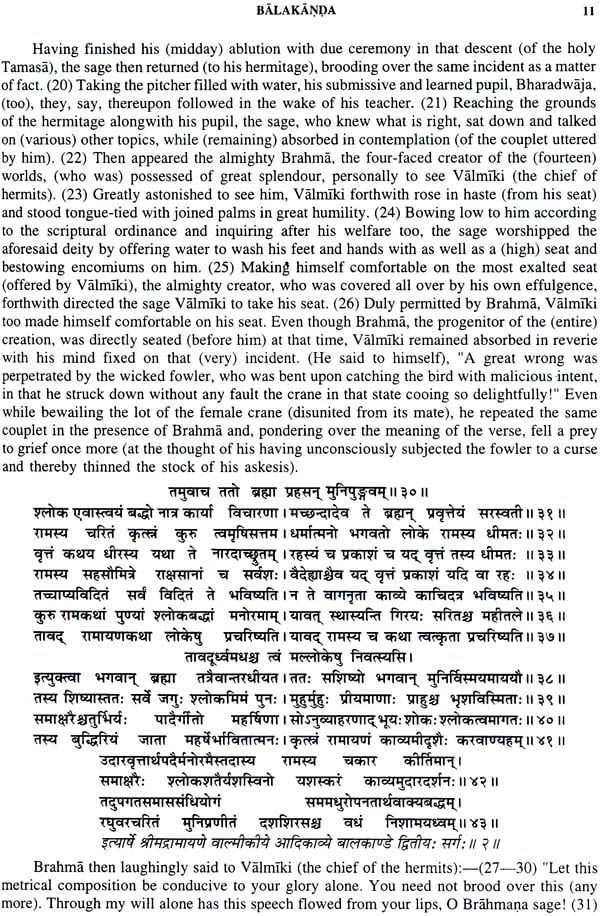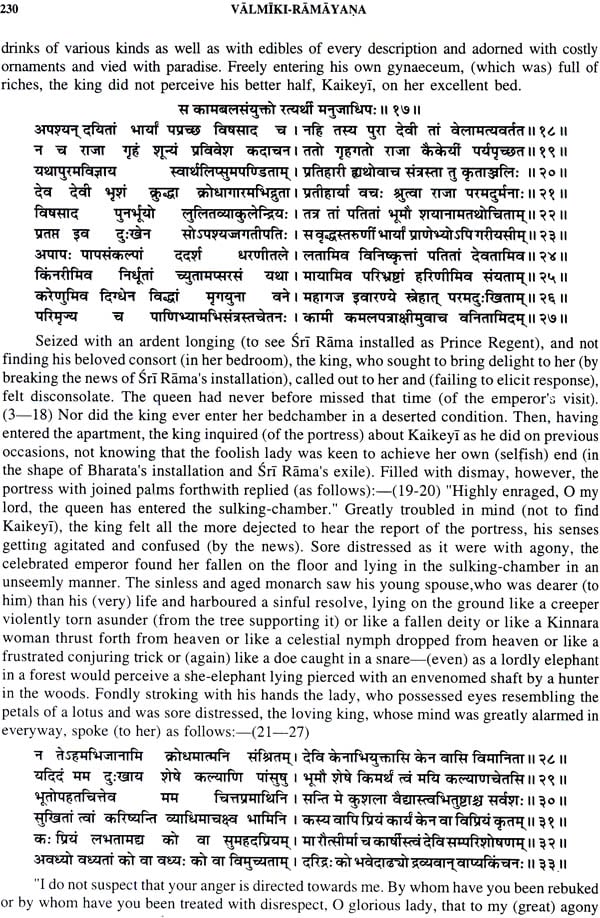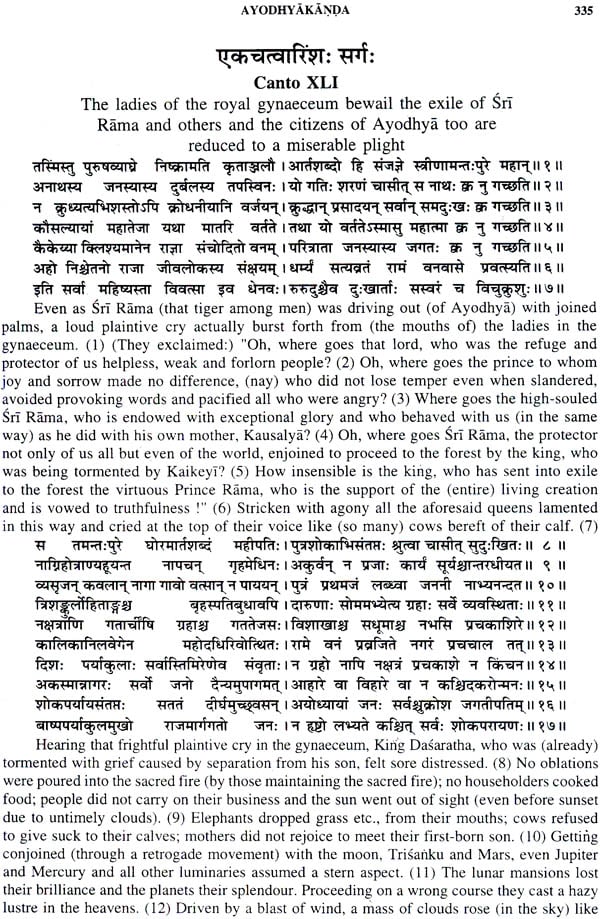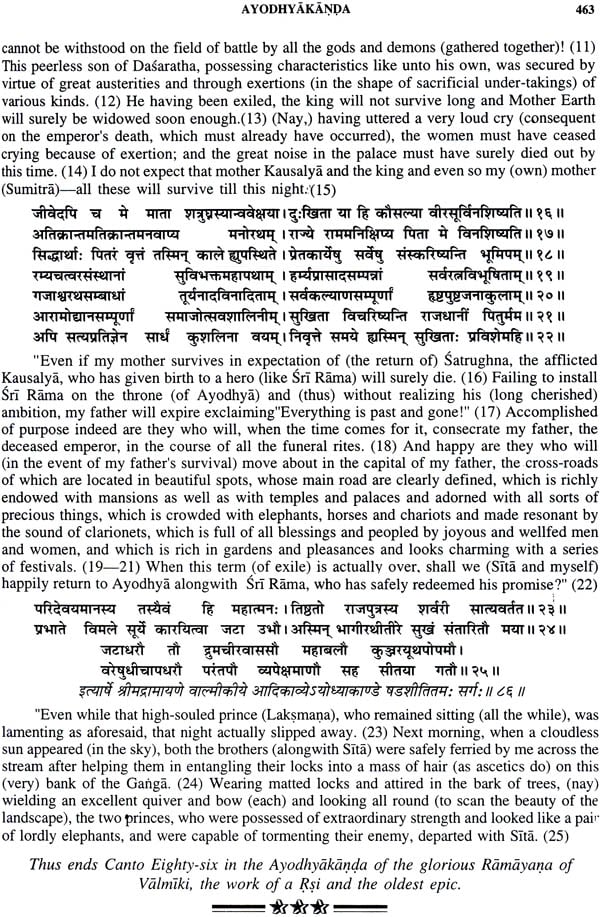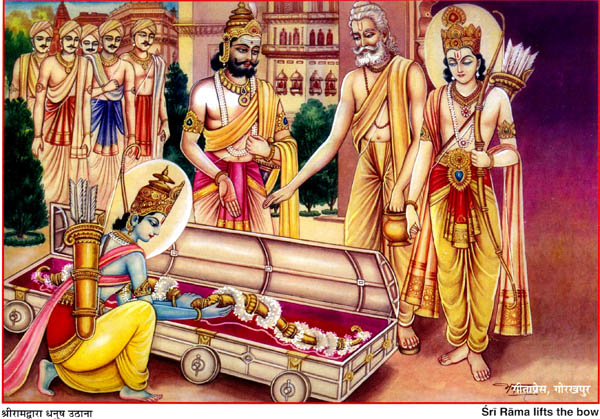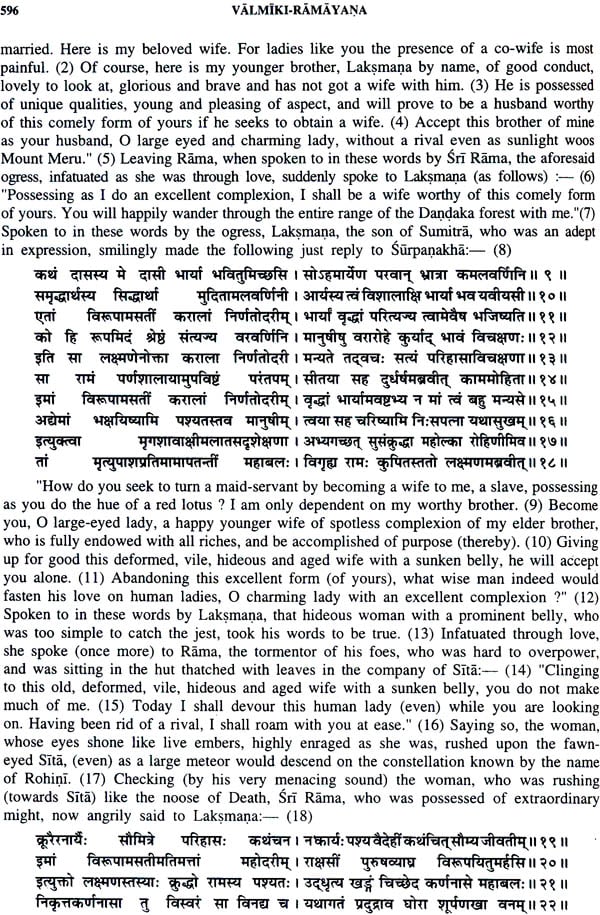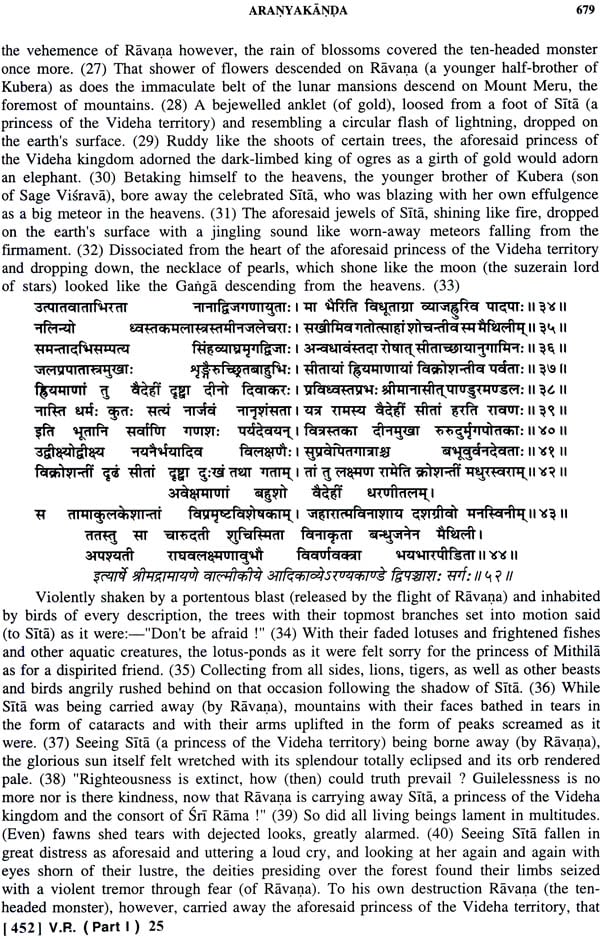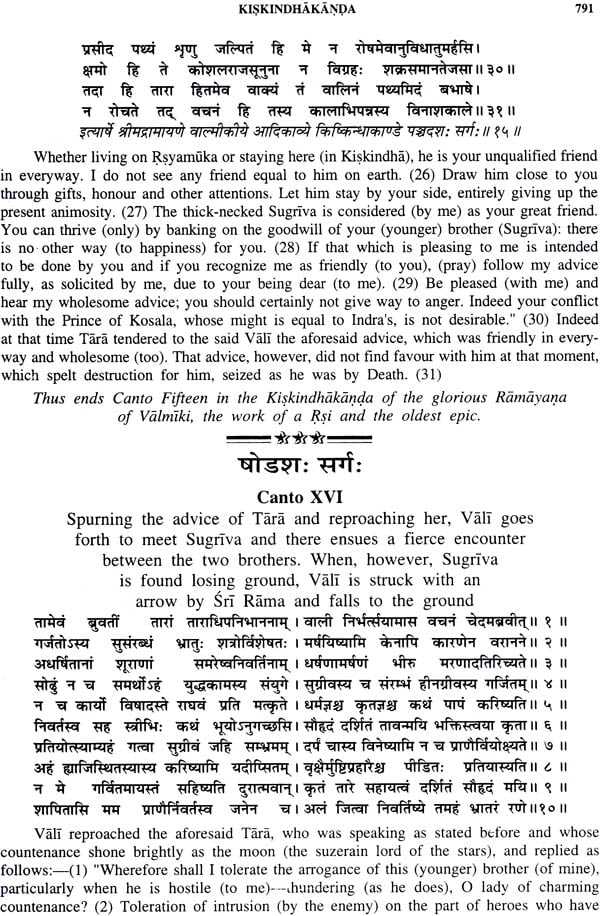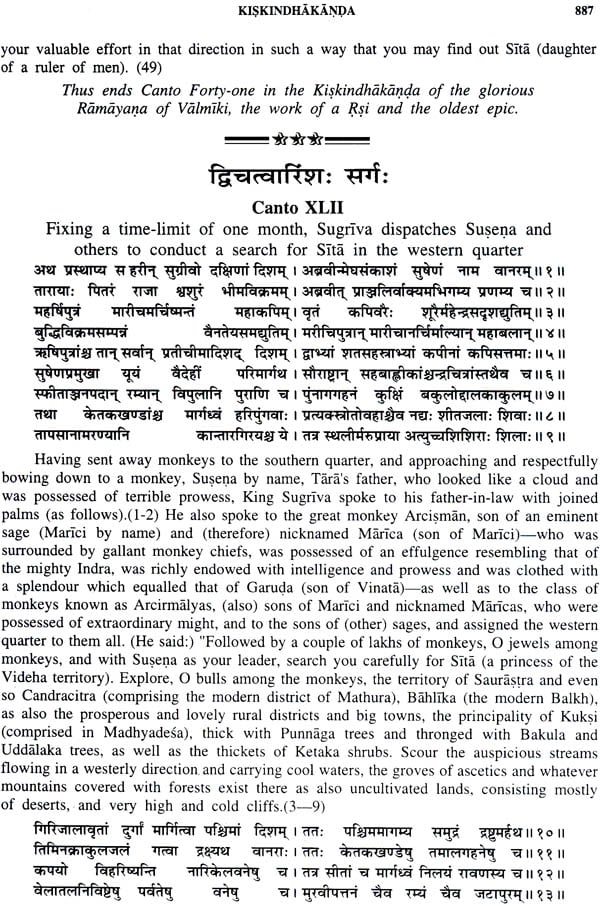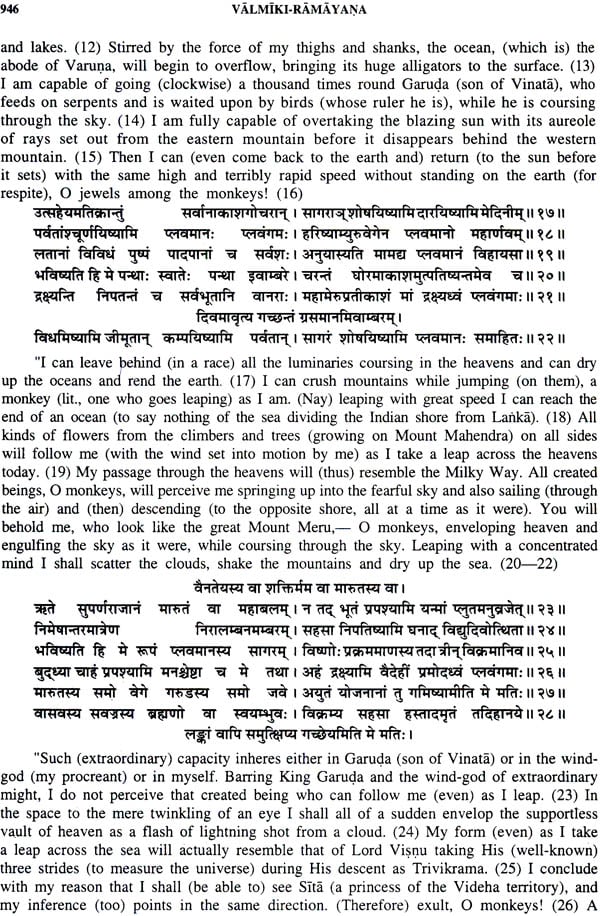
Srimad Valmiki-Ramayana Volume-I
Book Specification
| Item Code: | IDJ168 |
| Publisher: | Gita Press, Gorakhpur |
| Language: | (With Sanskrit Text and English Translation) |
| Edition: | 2021 |
| ISBN: | 812930029X |
| Pages: | 948 |
| Cover: | Hardcover |
| Other Details | 10.9" X 7.5" |
| Weight | 1.67 kg |
Book Description
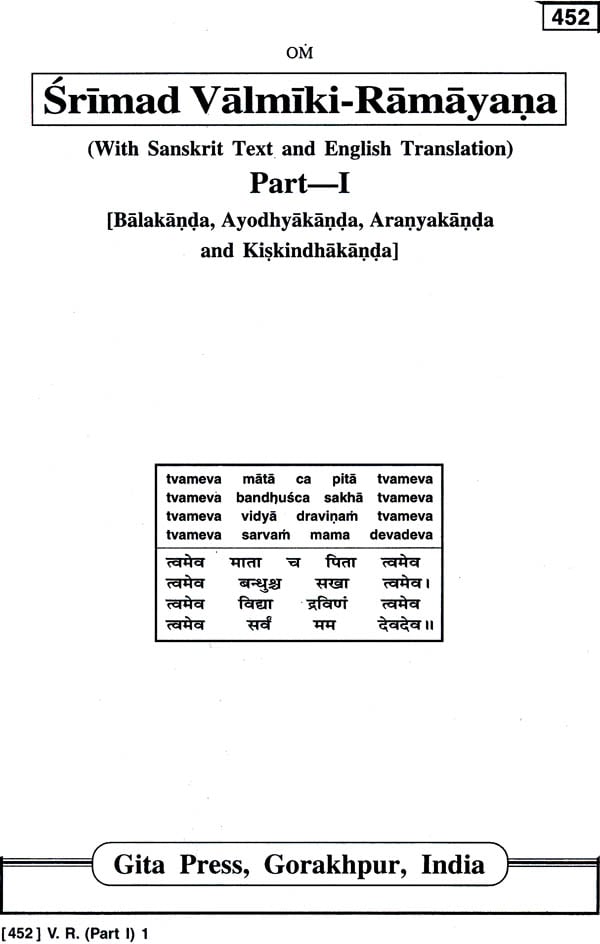
The Valmiki-Ramayana is read all over India with great reverence and love as it contains the most authentic story of Lord Sri Rama, one of the two most popular Avataras who lived amongst us thousands of years ago but have left an indelible impression on our lives, which is as fresh today as it was during the time of Valmiki, a contemporary of Sri Rama. It is one of the world's most remarkable classics and excels all in its moral appeal. It is full of lessons for all and deserves to be read with interest and benefit by all lovers of healthy literature. It is noted for its poetic excellences and is the oldest specimen of epic poetry. An authentic and readable translation of this world-renowned book was published in Hindi, the national language of India, many years ago after critically editing the text with the help of different recensions, and is very widely read all over the Hindi-speaking and adjacent areas.
For the benefit of those who cannot read Hindi and at the same time who are not so well - versed in Sanskrit as to understand and appreciate original Sanskrit text, an accurate and faithful English translation of this sacred text by scholarly translators has been made by Gita Press. Some years before we have published the entire Katha of Valmiki-Ramayana in serials under the caption of Valmiki-Ramayana number in our English monthly journal 'The Kalyana-Kalpataru'. After that as an independent work we published the Valmiki-Ramayana in three volumes: - Part one containing Balakanda and Ayodhyakanda, part two containing Aranyakanda, Kiskindhakanda and Sundarakanda; part three containing Yuddhakanda and Uttarakanda. But since we received a number of suggestions from our readers to reduce the number of volumes as much as possible, we are publishing it in two volumes-Volume one containing Balakanda to Kiskindhakanda and volume two Sundarakanda to Uttarakanda. In doing so convenience of the readers was the main consideration and at the same time the book has been saved from being unmanageably bulky.
Although great care has been taken in translating and printing these books, typographical and other errors may have crept in and we crave the of our kind readers for them. In our translation we have tried to reproduce the meaning of the original as best as possible so as to enable the reader to follow the text word by word, and made it as close as possible, preserving even the grammatical peculiarities of the original and translating even indeclinables like cha, khalu, veh, hi, ha, nu and so on which cannot called redundant in the work of a Rsi. We leave it to our learned readers, who are conversant with both the languages, to judge how far we have done justice to the work which has fallen on our weak shoulder. In the end we dedicate our humble effort to the Almighty Lord Sri Rama, who has sustained us throughout in His abundant grace and enabled us to bring out these volumes.
The Valmiki-Ramayana
Balakanda
Book One
| Number of Cantos: | Page | |
|---|---|---|
| 1. | The celestial sage Narada narrates to Valmiki the Story of Sri Rama in a nutshell. | 1 |
| 2. | Brahma's visit. | 9 |
| 3. | A brief outline of the Ramayana as given by the poet himself. | 12 |
| 4. | After his ascension to the throne of Ayodhya Sri Rama listens to his own story as sung by his sons (Kusa and Lava). | 16 |
| 5. | A description of the city of Ayodhya. | 20 |
| 6. | A description of the city of Ayodhya and the prosperity of its inhabitants during the reign of King Dasaratha. | 22 |
| 7. | The virtue and upright conduct of the eight minister of Emperor Dasaratha. | 24 |
| 8. | The King's proposal to perform a horse-sacrifice for being blessed with a son and the acclamation of the counselors and other Brahmanas. | 26 |
| 9. | A dialogue between Emperor Dasaratha and Sumantra. | 29 |
| 10. | How the sage Rsyasrnga was lured away to the capital of Romapada and married to his adopted daughter, Santa. | |
| 11. | Urged by Sumantra, Emperor Dasaratha calls on his friend, King Romapada, and brings with the latter's permission Santa and Rsyasrnga to his own palace. | 33 |
| 12. | Emperor Dasaratha gives his consent to the performance of a horse sacrifice for being blessed with a son. | 36 |
| 13. | Feudatory chiefs called under orders of the emperor and charged with the duty of setting up stables etc. | 38 |
| 14. | King Dasaratha proceeds with the horse-sacrifice; Rsyasrnga grants him a boon regarding the birth of four sons. | 41 |
| 15. | Rsyasrnga conducts a sacrifice for securing the birth of sons to Dasaratha; the gods approach Brahma in that very sacrifice with a prayer for bringing about the death of Ravana; Brahma implores Lord Visnu (also present there) to descend in the house of Dasaratha and do away with Ravana and the Lord undertakes to kill Ravana. | 46 |
| 16. | A dialogue between Lord Visnu and the gods bearing on Ravana; on the disappearance of the Lord an attendant of Prajapati (Lord Visnu, the Protector of all created beings) rises from the sacrificial pit and hands over to Dasaratha a basin containing milk boiled with rice and sugar and the latter divides it among his wives. | 49 |
| 17. | Birth of monkey chiefs from the loins of different gods under the direction of Brahma. | 51 |
| 18. | Advent of Sri Rama, Bharata and others; festivities in heaven as well as in Ayodhya; their investiture with the sacred thread; the arrival of Viswamitra. | 54 |
| 19. | King Dasaratha is stunned to hear the request of Viswamitra to send Sri Rama with him to dispose of the Raksasas that interfered with his sacred observances. | 59 |
| 20. | Dasaratha declines to part with Sri Rama thereby enraging Viswamitra. | 61 |
| 21. | The wrath of Viswamitra; the intercession of Vasistha in favour of Viswamitra. | 63 |
| 22. | King Dasaratha sends Sri Rama and Laksmana with Viswamitra and the two princes receive initiation from the latter in the two mystic spells Bala and Atibala. | 65 |
| 23. | Night-long sojourn of Sri Rama and Laksmana with Viswamitra in a holy hermitage at the confluence of the Ganga and the Sarayu. | 67 |
| 24. | An account of the Sarayu given by Viswamitra; some facts relating to the ogress Tataka revealed and hints given about killing her. | 69 |
| 25. | Questioned by Sri Rama, Viswamitra tells him more about the birth of Tataka, of her marriage with Sunda, as well as about the birth of Marica as a result of their union, and how the latter was subjected to an execration by the sage Agastya, and finally urges Sri Rama to dispatch the ogress. | 72 |
| 26. | Sri Rama kills Tataka. | 74 |
| 27. | Gratified with the death of Tataka, Viswamitra imparts to Sri Rama the knowledge of the various missiles. | 77 |
| 28. | At the request of Sri Rama the sage Viswamitra instructs him as well as Laksmana in the process of calling back the missiles and delivers some more missiles to them. | 79 |
| 29. | Viswamitra tells Sri Rama the history of Siddhasrama and arrives at his own hermitage with the two brothers. | 81 |
| 30. | Sri Rama protects the sacrifice of Viswamitra against the onslaught of the Raksasas and gets rid of them. | 84 |
| 31. | Accompanied by Sri Rama, Laksmana and a host of Rsis, Sage Viswamitra proceeds northward in the direction of Mithila to witness the bow-sacrifice of King Janaka and breaks his journey on the bank of the Sona at sunset. | 86 |
| 32. | An account of the four sons of Kusa; the hundred daughters of Kusanabha turn hunch-backed under a curse of the wind-god | 88 |
| 33. | Kusanabha applauds the forbearance and forgiveness of his daughters; the story of the birth of Brahmadatta and his marriage with Kusanabha's daughters. | 91 |
| 34. | Kusanabha performs a sacrifice for the birth of a son and is blessed with one, Gadhi by name; the glory of the river Kausiki (the modern Kosi in Bihar). | 93 |
| 35. | Crossing the Sona, Viswamitra and party reach the bank of the holy Ganga and spend the night there. Requested by Sri Rama, he narrates the story of the origin of the Ganga. | 95 |
| 36. | Gods interrupt the amorous pastimes of Lord Siva and His Consort, Goddess Uma, on which She curses gods including Mother Earth. | 97 |
| 37. | A detailed account of Kartikeya's birth through Ganga. | 99 |
| 38. | The narrative of King Sagara, a former king of Ayodhya and a forefather of Sri Rama. | 102 |
| 39. | Indra steals away the horse released by Sagara as a prelude to his horse sacrifice; his sixty thousand sons proceed to excavate the earth in quest of the horse and the gods in terror apprise Brahma of this daring of theirs. | 104 |
| 40. | Brahma reassures the gods by telling them that the sons of Sagara will be destroyed by the curse of Sage Kapila. The sons of Sagara in the course of their excavation arrive in the presence of Kapila and, behaving insolently towards him, are forthwith reduced to ashes by the fire of his wrath. | 106 |
| 41. | Under orders of Sagara his grandson Amsuman proceeds to Rasatala through the underground passage made by his uncles and, bringing back the sacrificial horse, tells the king about the fate of his uncles. | 108 |
| 42. | Amsuman and his grandson, Bhagiratha, successively practise austerities for bringing down the Ganga to the terrestrial plane. Brahma grants a boon to Bhagiratha and exhorts him to propitiate Lord Siva and secure His consent to receive the Ganga on His head. | 111 |
| 43. | Pleased with the asceticism of Bhagiratha, Lord Siva receives the Ganga on His head and discharges it into Bindusarovara. Branching forth into seven streams it then accompanies Bhagiratha to Rasatala and liberates his forbears on the way. | 113 |
| 44. | Applauding Bhagiratha, Brahma urges him to gratify the souls of his departed great grand-uncles by offering them the water of the Ganga, and after doing his bidding Bhagiratha returns to his capital; the glory of hearing and reading the story of Ganga's descent on earth. | 116 |
| 45. | Viswamitra tells Sri Rama how in the remote past the gods and the demons conjointly churned the ocean of milk, using Mount Mandara as the churning rod, how Lord Siva drank off the deadly poison skimmed out of it, how as a result of that churning appeared Lord Dhanvantari, a bevy of Apsaras, the beverage known by the name of Varuni, the horse Ucchaihsrava, the Kaustubha gem and nectar, and how the conflict of gods and the Daityas ended in the destruction of the latter | 118 |
| 46. | Disconsolate over the death of her sons, Diti embarks on a course of austerities at Kusaplava with the permission of her husband, Sage Ksayapa, with the object of securing a son capable of killing Indra. The latter on coming to know of her intention serves her during the period of her consecration and, taking advantage of her falling asleep on one occasion with her head in a wrong position and thereby transgressing the rules of purity, enters her womb and carves the foetus. | 122 |
| 47. | Viswamitra tells Sri Rama how on the very site of the grove where Diti practiced her austerities Visala, a son of Ikswaku, built the city of Visala. Sumati the contemporary ruler of Visala, receives Viswamitra and his party as his distinguished guests. | 124 |
| 48. | Having stayed overnight at Visala as an honoured guest of Sumati, Sri Rama, accompanied by Viswamitra and the other sages, heads towards Mithila (the capital of King Janaka) and, on reaching on the way a deserted hermitage and, inquiring about it is told by Viswamitra how Ahalya, wife of Sage Gautama, whose hermitage it was, was subjected to a curse by her husband. | 126 |
| 49. | At the intercession of the gods Indra is supplied with testicles of a ram; Ahalya gets back her pristine celestial form at the very sight of Sri Rama the moment he enters the hermitage, and the two divine brothers are entertained by the lady with the help of her husband. | 128 |
| 50. | Sri Rama and others reach Mithila and are received in advance by King Janaka, headed by his family priest, Satananda, and Viswamitra satisfies their curiosity about the two princes of Ayodhya. | 130 |
| 51. | At the request of Satananda Viswamitra tells him how Ahalya was redeemed by Sri Rama and entertained him with the help of her husband. And Satananda in his turn commences narrating to Sri Rama the story of Viswamitra. | 133 |
| 52. | Vasistha enjoins his cow of plenty, Sabala by name, the yield necessary articles for entertaining Viswamitra. | 135 |
| 53. | Heartily entertained alongwith his army by Vasistha with delicious foods and drinks yielded by his cow of plenty, Viswamitra asks of him the cow, which Vasistha declines to part with. | 137 |
| 54. | On Viswamitra attempting to take her away by force, Sabala seeks to know Vasistha's mind, and at his instance produces a multitude of warriors that disperse Viswamitra's army. | 139 |
| 55. | His entire army having been exterminated by the warriors produced by Sabala and his hundred sons reduced to ashes by the very roar of Vasistha even as they assailed him, Viswamitra retires to the Himalayas for austerities and, receiving a number of missiles from Lord Siva, tries them on the inmates of Vasistha's hermitage; Vasistha meets him with a mere staff appropriate to a Brahmana. | 141 |
| 56. | With his Brahmanical staff alone Vasistha renders ineffectual all the mystic missiles discharged by Viswamitra, whereupon the latter condemns military strength and makes up his mind to practise austerities with a view to attaining Brahmanhood. | 143 |
| 57. | Viswamitra embarks on a severe course of austerities with a view to attaining Brahmanhood. In the meantime King Trisanku of Ayodhya requests Vasistha to conduct for him a sacrifice which may enable him bodily to ascend to heaven and, on Vasistha declining to comply with his request, approaches his sons for the same purpose. | 145 |
| 58. | Having been repulsed by Vasistha's sons as well, Trisanku gets ready to seek another priest, whereupon he is degraded by the curse of Vasistha's sons to the position of a Candala and approaches Viswamitra with the same request. | 147 |
| 59. | Viswamitra assures Trisanku of his help, sends word to a number of sages, inviting them to conduct a sacrifice for Trisanku, and pronounces a curse on those who declined to come. | 149 |
| 60. | At the instance of Viswamitra the sages assembled at his hermitage commence a sacrifice; on the gods failing to appear at the sacrifice to accept the offerings, Viswamitra sends Trisanku bodily to heaven by dint of his own spiritual power, but the latter is expelled by Indra, on which Viswamitra stops him in the air and proceeds to create a new heaven and desists from his purpose only on the gods granting his desire. | 151 |
| 61. | The animal to be sacrifice at the sacrificial performance of King Ambarisa having been stolen away by Indra appearing in disguise, the arch-priest enjoined the king to secure a human beast as a substitute. Wandering in search of such a beast, Ambarisa saw the sage Rcika at Bhrgutunga and requested him to hand over his juvenile son in exchange for a hundred thousand cows. On the parents declining to part with their eldest and youngest sons, the middle one, Sunahsepa by name, voluntarily offered himself for being sold and the king returned with him to his capital. | 154 |
| 62. | On reaching Puskara, while Ambarisa is taking rest, Sunahsepa approaches Viswamitra, who was practicing austerities there, and inquires of him a means of escaping death without meeting with the king's opposition, whereupon Viswamitra teaches him a prayer each of propitiating Indra and Lord Visnu respectively, by reciting which the boy secures release from Ambarisa's bondage and the latter gets the reward of the sacrifice without sacrificing him. | 156 |
| 63. | Brahma pays a visit to Viswamitra at Puskara and rewards him with the status of a Rsi (seer). There he feels enamoured of Menaka, a celestial nymph deputed by Indra, and enjoys life with her for ten years. At last he realizes his folly and retires to the Himalayas, where he renews his austerities and is rewarded with the status of a Maharsi by Brahma. Still dissatisfied, he prosecutes his austerities with renewed vigour. | 159 |
| 64. | Petrifying by means of a curse Rambha, the celestial nymph sent by Indra to wean him from his austerities, Viswamitra resolves upon a further course of austerities. | 161 |
| 65. | On Viswamitra not ceasing from his austerities even on his being conferred the title of a Brahmarsi by Brahma, Vasistha as urged by gods recognizes it and here ends the narration of Satananda. Having worshipped Viswamitra, King Janaka then returns to his palace. | 163 |
| 66. | On Viswamitra apprising Janaka of the eagerness of Sri Rama and Laksmana to see his famous bow, Janaka reveals to him its glory and tells him how he got it as well as Sita and also of his pledge to give her in marriage to Sri Rama if he should string it. | 166 |
| 67. | Urged by Viswamitra, Sri Rama bends the bow, sent by Janaka to the sacrificial hall, in order to string it and in the process breaks it, whereupon Janaka with the concurrence of Viswamitra sends his counselors to Ayodhya to invite Emperor Dasaratha for the wedding. | 168 |
| 68. | Reaching Ayodhya, the counselors of Janaka tell Dasaratha how Sri Rama broke the bow of Janaka and won the hand of his daughter, and convey to him their master's invitation for the wedding, on which Dasaratha makes up his mind in consultation with Vasistha to depart for Mithila as an early date. | 171 |
| 69. | With a large number of followers Dasaratha proceeds to Mithila for the wedding and is received with signal honour by Janaka and his people and comfortably lodged. | 172 |
| 70. | Janaka sends for his younger brother, Kusadhwaja, from Sankasya. Invited by him, Dasaratha meets Janaka at the latter's palace, where at the instance of Dasaratha Vasistha glorifies the race of Ikswaku. | 174 |
| 71. | Recounting his own pedigree, Janaka offers the hand of his two daughters, Sita and Urmila, to Sri Rama and Laksmana respectively. | 178 |
| 72. | Vasistha and Viswamitra jointly ask for the hand of the two daughters of Kusadhwaja in favour of Bharata and Satrughna and Janaka acquiesces in the proposal. Thereupon Dasaratha gets his sons to perform the rite of Samavartana and himself performs the Nandisraddha. | 180 |
| 73. | Janaka escorts Dasaratha and his four sons clad in nuptial attire to the pavilion erected for the wedding. Placing Viswamitra and Satananda at his head, Vasistha conducts the marriage ceremony. Sri Rama and his three brothers clasp the hand of Sita and her sisters. Singing and dancing for joy, the gods rain heavenly flowers on the brides and bridegrooms. | 182 |
| 74. | Taking leave of Janaka and Dasaratha, Viswamitra returns to his own hermitage and, accepting large wedding presents. Dasaratha too turns back to Ayodhya alongwith his sons and their newly - wedded brides. On the way the irascible and redoubtable Parasurama, a sworn enemy of the Ksatriyas, suddenly appears before them, axe in hand, and Vasistha and the other sages accompanying the party offer worship to him. | 185 |
| 75 | Turning a deaf ear to Dasaratha's prayer, Parasurama relates the history of the bows belonging to Lords Siva and Visnu, and challenges Sri Rama to string the bow of Lord Visnu in his possession. | 187 |
| 76. | Fitting the arrow to the bow of Lord Visnu and declaring it as unfailing, Sri Rama asks Parasurama to point out at whom it may be discharged, and at the instance of the latter puts an end to his title to the (ethereal) worlds earned by him through his austerities. Recognizing Sri Rama to be no other than Lord Visnu and taking leave of him. Parasurama withdraws to Mount Mahendra in order to resume his austerities. | 190 |
| 77. | On the departure of Parasurama Sri Rama hands over the bow of Lord Visnu to Varuna (the god of water) and, sending his army ahead, King Dasaratha enters Ayodhya. After some days Prince Yudhajit, Bharata's maternal uncle, takes away Bharata and Satrughna to his father's capital. | 192 |
| Book Two | ||
| Number of Cantos: | Page | |
| 1. | Bharata having left for his maternal grandfather's capital alongwith Satrughna. Emperor Dasaratha makes up his mind to install Sri. Rama as his regent and, summoning a number of princes for consultation. Confers with them on the subject. | 195 |
| 2. | Dasaratha apprises the assembly of his intention to retire from active rule after relegating the power to Sri Rama's able hands and the councilors with one voice say ditto to the proposal and urge the emperor to expedite matters. | 200 |
| 3. | Urged by the emperor to solemnize the installation of Sri Rama as Prince Regent, Vasistha enjoins in his turn Dasaratha's ministers, Sumantra and others, to get ready all requisites for the ceremony. Sent by Sumantra, Sri Rama in the meantime calls on his father, who announces his decision to install him as Prince Regent and also tenders some opportune advice to him. Sri Rama's chums break the news to Sri Rama's mother, Kausalya; and, treasuring in his mind the exhortation of his father and bowing low to him, Sri Rama returns to his own apartments. | 204 |
| 4. | Apprehending obstruction of Sri Rama's installation from an ominous dream, Dasaratha summons Sri Rama immediately and asks him to observe certain sacred vows preliminary to installation alongwith Sita. Dismissed by his father, he enters his mother's gynaeceum and, after receiving her blessings, retires alongwith Sita, already present there, to his own palace. | 209 |
| 5. | At the instance of the emperor, Vasistha calls at Sri Rama's palace and, instructing him alongwith Sita to fast for the night, returns to Dasaratha. Permitted by the sage, the emperor adjourns the assembly and retires to the gynaeceum. | 212 |
| 6. | Enjoined by the sage Vasistha, Sri Rama undertakes a vow to bathe early next morning, worship the gods and sleep for the night on a mat of Kusa grass. On waking up the next morning, he says his Sandhya prayers and Brahmanas wish him a propitious day. The citizens decorate the city in order to give it a festal appearance and it is thronged with men eager to witness the installation of Sri Rama as Prince Regent. | 214 |
| 7. | Beholding the festivities and finding Kausalya bestowing large gifts of money on Brahmanas, Manthara, a hunchbacked hereditary maid-servant of Queen Kaikeyi, who had accidentally ascended the roof of the palace, inquires of Sri Rama's erstwhile nurse the occasion for the festivities and, on being told of Sri Rama's forthcoming installation, feels enraged and, approaching Kaikeyi, instigates her to stop the installation. Kaikeyi on the other hand, feels rejoiced over the news and gifts her a jewel as a token of her pleasure. | 217 |
| 8. | While Manthara was thus trying to impress on Kaikeyi's mind that the installation of Sri Rama on the throne of Ayodhya would spell disaster to Bharata, Kaikeyi for her part went on harping on Sri Rama's virtues and maintained that his installation as Prince Regent was quite welcome to her, Manthara, however, goes on labouring her point and urges Kaikeyi to interrupt the installation | 220 |
| 9. | Kaikeyi, whose heart was poisoned by the malicious gossip of Manthara as aforesaid, takes a vow to see that Rama is sent into exile and Bharata installed as Prince Regent, and asks Manthara herself how to secure that consummation. Manthara tells her how in the course of a conflict between gods and demons, in which Dasaratha's help was enlisted by the gods, the queen, who had accompanied her husband to the field of operations and had rendered valuable assistance to him at a critical juncture, was offered a couple of boons, which she had kept in abeyance. Manthara now asks Kaikeyi to demand the banishment of Rama and the installation of Bharata against the two promised boons. Kaikeyi accordingly throws away her ornaments and lies down on the bare floor in the sulking-room in a sullen mood. | 223 |
| 10. | Having told off Sumantra and others to get together necessaries for the installation of Sri Rama, Dasaratha calls on Kaikeyi to break the happy news to her. Not finding her in her apartments, however, he makes inquiries from the portress, who tells him of her presence in the sulking chamber. The emperor calls on her there and, lifting her up, cajoles her. | 228 |
| 11. | Egged on by Kaikeyi to grant her desire. Dasaratha gives his word of honour to her to that effect. Invoking the presence of gods as witnesses and reminding the emperor of what took place during the conflict of gods and demons, Kaikeyi asks of him the two boons, promised by him, in the shape of exiling Sri Rama for a period of fourteen years and installing Bharata as Prince Regent. | 232 |
| 12. | Extolling the virtues of Sri Rama and showing him undeserving of exile, the emperor endeavours to dissuade Kaikeyi from her pertinacity in sending Sri Rama into exile. Quoting the examples of Hariscandra and others, Kaikeyi, however, redoubles her insistence. The emperor for his part rebukes her in harsh words and goes the length of falling at her feet in order to bring her round but in vain. | 234 |
| 13 | Further tormented by Kaikeyi through her importunity to have the boons granted by the emperor implemented, the latter piteously wails his lot and reproaches her. The sun having set in the meanwhile, the emperor continues till the following morning his solici5tations to Kaikeyi to allow Rama to be installed as Prince Regent. But, Kaikeyi remaining adamant, the king in his extreme anguish of mind sinks down unconscious on the floor and, on regaining his consciousness, stops all music pertaining to the occasion of the king's quitting his bed. | 243 |
| 14. | Citing other instances of the emperor's fidelity to truth and threatening to lay down her life in the event of his not carrying out her wishes, Kaikeyi insists on his sending Sri Rama into exile at once and does not desist from her purpose even when railed at by her husband. In the meantime Sumantra makes his appearance in the gynaeceum and, extolling the emperor, reminds him of his intention to install Sri Rama a Prince Regent and eventually leaves the gynaeceum in order to summon Sri Rama at the instance of the emperor. | 245 |
| 15. | While going out of the gynaeceum to bring Sri Rama, Sumantra sees Vasistha and others as well as a number of kings waiting at the gate and hastens back to announce their presence to the king. He is, however, sent back to fetch Sri Rama and forthwith enters the latter's apartments. | 251 |
| 16. | Seeking the presence of Sri Rama, Sumantra communicates to him the emperor's command asking Sumantra to bring Rama with him, and departs. Mounting his gold chariot and accompanied by Laksmana, who holds an umbrella over the former's head and waves a pair of chowries in order to fan him, and followed by a number of elephants and horses, Sri Rama drives in state to see Dasaratha, listening en route to his own glory sung by jubilant men and women. | 255 |
| 17. | Sri Rama drives in state to his father's gynaeceum, beholding en route the charms of Ayodhya, hearing the blessings and encomia of his friends and relations and ravishing the eyes of all on-lookers, and on reaching his destination sends back his retinue and seeks the presence of his royal father alone. | 259 |
| 18. | Questioned by Sri Rama as to what prayed on his father's mind, Kaikeyi tells him all that had happened in the meantime and sternly urges him to depart for the woods. | 261 |
| 19. | Having agreed to leave for the forest, Sri Rama proceeds to take leave of his mother Kausalya. | 264 |
| 20. | Even as Sri Rama issued forth from the palace of Queen Kaikeyi, the inmates of the gynaeceum burst into a piteous wail, extolling the prince's virtues. Mother Kausalya embraces and pronounces her benedictions on Sri Rama as the latter approaches her and falls at her feet. On being apprised of the circumstances that had brought him there, she falls to the ground overwhelmed with grief, and weep bitterly expressing her deep sorrow. | 267 |
| 21. | Consoling Kausalya in her grief over the impending exile of Sri Rama, Prince Laksmana opposes the idea of Sri Rama's leaving for the forest and, censuring Dasaratha, makes up his mind to accompany his eldest brother. Kausalya too deters Sri Rama from going into exile branding Kaikeyii's command as unjust. Sri Rama, however, justifies the command on the ground of its being countenanced by the emperor and requests his mother to grant him leave and perform auspicious rites connected with his departure. | 272 |
| 22. | Sri Rama pacifies Laksmana, who was angry with Kaikeyi, by denying the instrumentality of Kaikeyi in his banishment and laying the entire blame on his own fate. | 277 |
| 23. | Enraged to hear the exhortation of Sri Rama, Laksmana urges in reply that the word of their father was worth ignoring inasmuch as it was divorced from righteousness and, further emphasizing the predominance of personal effort over destiny, persuades Sri Rama to take up arms against those who interfere with his installation and occupy the throne of Ayodhya by force. Sri Rama, however, pacifies Laksmana and impresses on him the imperative necessity of their carrying out the command of their father. | 280 |
| 24. | Finding Sri Rama firm in his obedience to the command of his parents, Kausalya (Sri Rama's mother) urges him to take her alongwith him. On being told, however, that it was incumbent on a matron whose husband was alive to remain with the latter and serve him, she consents to Sri Rama's departure to the forest. | 283 |
| 25. | Having received the mother's benedictions for the journey, Sri Rama falls at her feet and proceeds to the apartments of Sita in order to see her. | 286 |
| 26. | Beholding Sri Rama depressed in spirits and lusterless with frustration writ large on his countenance, Sita, who knew nothing about the interruption of his installation and had been eagerly and joyfully awaiting his ruturn, inquires about the cause of his dejection and is told how his installation has been stopped and how he is going to be sent into exile by his father, and is exhorted to look after her father-in-law and mothers-in-law as before and to treat Bharata and Satrughna as her own brothers or sons and never to harbour malice towards them. | 290 |
| 27. | Exhorted by Sri Rama to stay in Ayodhya to look after his parents. Sita submits in reply that, she being his counterpart, her exile is implied in his and insists on her being taken with him since she would not be able to bear separation from him. | 293 |
| 28. | Bringing home to Sita the austerity and hardships of forest life Sri Rama tries once more to dissuade her from her insistence on accompanying him to the forest. | 295 |
| 29. | Sita continues to importune Sri Rama to take her to the forest along with him, Sri Rama, however, is adamant and goes on consoling her and asking her to stay in Ayodhya. | 297 |
| 30. | Though consoled by Sri Rama in many ways, Sita does not change her mind and seeing her insistent on accompanying him Sri Rama agrees to take her to the forest and asks her to prepare for the journey and to give away all her personal property to the Brahmanas. | 299 |
| 31. | Hearing the dialogue of Sri Rama and Sita, Laksmana seeks his permission to accompany him to the forest, Sri Rama, desires him to stay in Ayodhya in order to look after his mothers. But seeing his insistence, he agrees to take him as well and urges him to bring Suyajna and other Rsis, accounting them worthy of receiving gifts from him. | 303 |
| 32. | Having received gifts of jewels and ornaments from Sri Rama and Sita, Suyajna invokes divine blessings on the couple. Enjoined by Sri Rama, Laksmana then bestows silk costumes and ornaments etc., on the sons of Sage Agastya and others. Urged by his wife, a sage, Trijata by name, approaches Sri Rama and seeks riches from him. Sri Rama thereupon bestows on him thousands of cows and distributes his remaining wealth among other Brahmanas as well as among his relations and dependants. | 306 |
| 33. | Having distributed his immense riches among the Brahmanas and others, Sri Rama, accompanied by Sita and Laksmana, proceeds to his father's gynaeceum to take leave of him. Remaining unruffled even on hearing en route the diverse talks of the citizens gathered here and there with melancholy writ large on their faces, the royal trio reach their destination and urge Sumantra to apprise their royal father of their arrival. | 306 |
| 34. | Apprised of Sri Rama arrival by Sumantra. Dasaratha commands him to usher in Sri Rama with his consort. Seeing the emperor fall unconscious at the very sight of the heir-apparent, the ladies of the royal household start wailing piteously. On Sri Rama's soliciting his permission to retire to the woods the king enjoins him to take his father captive and ascend the throne. Sri Rama in his turn consoles his father by assuring him that he has no hankering for royal fortune and that to him obedience to his father's command is of utmost importance. Dasaratha, however, falls unconscious again at the very thought of his separation from Sri Rama, and Sumantra as well as all the ladies of the gynaeceum follow suit. | 312 |
| 35. | Hoping that by being provoked to anger Kaikeyi might come round and relax her insistence on sending Sri Rama into exile, Sumantra harshly reproaches her, reminding her of her mother's misbehaviour towards her husband (Kaikeyi's father). Kaikeyi, however, remains adamant and does not budge even an inch from her purpose. | 317 |
| 36. | Dasaratha instructs Sumantra to take a detachment of the army and the exchequer alongwith Sri Rama, to which Kaikeyi objects and insists on his being sent into exile without any resources on the analogy of Asamanja, son of the king's forefather, Sagara. Another minister of the kind, Siddhartha by name, who was present there, opposes Kaikeyi and urges that the analogy of Asamanja, who was a perverse lad, could not be applied in the case of Sri Rama, who possessed an ideal character and deserved in everyway to be installed in the office of Prince Regent. In the event of Kaikeyi vetoing the proposal the king threatens to accompany the heir-apparent. | 320 |
| 37. | Sri Rama urges his servants to fetch the bark of trees for being used as his wearing apparel. At this Kaikeyi herself brings them the desired dress, which both Sri Rama and Laksmana cover themselves with taking off their princely robes. Sita, however, finds it difficult to wear the bark supplied to her and ultimately puts it on over her own dress with the help of Sri Rama despite the remonstrances of Vasistha, who severely castigates Kaikeyi for her cruelty in exiling them. | 323 |
| 38. | Incensed to hear the loud wailing of those present at the scene on Sita being dressed as a hermitess, Dasaratha reproaches Kaikeyi. While departing, Sri Rama entreats his father to take care of his mother. | 326 |
| 39. | Sent away by Dasaratha, Sumantra gets a chariot ready to take Sri Rama and his party to the forest and Sita adorns herself with jewels brought by Chancellor of the Exchequer. Kausalya tenders opportune advice to her daughter-in-law and the latter bows to it. Sri Rama comforts Kausalya and offers apology to his other mothers, who burst into a wail | 327 |
| 40. | Going clockwise round Dasaratha (as a token of respect). Sita, Rama and Laksmana greet him. Accompanied by Sita, Sri Rama salutes Kausalya. Laksmana too hails Kausalya first and then his own mother, Sumitra. Sumitra for her part tenders salutary advice to her son. The princes and the princess having mounted the chariot, Sumantra flicks the horses. The citizens that had assembled closely follow the chariot; but unable to keep pace with its swift movement, they return desolate. Dasaratha too runs after the chariot alongwith Kausalya and others, but being unable to walk begins to totter and stops short on the road yielding to the remonstrances of his wise ministers. | 331 |
| 41. | The ladies of the royal gynaeceum bewail the exile of Sri Rama and others and the citizens of Ayodhya too are reduced to a miserable plight. | 325 |
| 42. | Sri Rama having departed for the forest in an exceptionally swift - going chariot. Dasaratha vainly seeks to cover the intervening distance on foot. The very dust raised by the chariot having disappeared after a while, the emperor feels doubly disconsolate and drops to the ground. When Kaikeyi comes forward to support him he scolds her and asks her not to touch his person. Kausalya then lifts him up and persuades him to return. His personal attendants take him to the latter's apartments and, seeing him plunged in grief, Kausalya seats herself beside him and begins to lament in various ways. | 326 |
| 43. | The Lament of Kausalya. | 339 |
| 44. | Establishing the greatness of Sri Rama, Sumitra who is a pastmaster in eloquence, assuages Kausalya's grief. | 341 |
| 45. | When the citizens that followed Sri Rama in his journey to the forest refuse to return even when requested by Sri Rama in many ways, unable as they were to bear separation from him, Sri Rama with Sita and Laksmana gets down from his chariot and begins to walk. The citizens try to deflect him from his course and persuade him to return, but in vain. At close of the day they all reach the bank of the Tamasa. | 343 |
| 46. | Having reached the bank of the Tamasa and thinking of the plight of the people of Ayodhya, Sri Rama lays himself down on a bed of leaves bewailing the lot of his parents and feeling reassured by the thought of Bharata's noble qualities; while Laksmana opens his dialogue with Sumantra on the divine excellences of Sri Rama. Waking up in the meantime, Sri Rama urges the charioteer-minister to drive the chariot in such a way as to put the citizens that had accompanied them off the scent and lead them to think that the chariot had turned back towards Ayodhya instead of proceeding towards the forest. He then mounts the chariot alongwith Sita and Laksmana and presses on to the forest. | 346 |
| 47. | The citizens that followed Sri Rama in his journey to the forest wake to find Sri Rama and his party gone and begin to reproach themselves. Overcome with grief they hunt up the tracks of his chariot; but unable to find them, they helplessly return to Ayodhya in utter despondency. | 349 |
| 48. | Told of Sri Rama's departure for the forest by the citizens who had gone out with Sri Rama and returned, unable as they were to find out the tracks of his chariot, their wives reproach Kaikeyi and break into lamentation. | 351 |
| 49. | Having covered a long distance in the meantime Sri Rama finishes his morning bath and devotions and, having crossed the Vedasruti, Gomati and Syandika rivers, presses forward talking with Sumantra. | 354 |
| 50. | Standing with his face turned towards Ayodhya, Sri Rama bids farewell to his birth-place and, sending back the people hailing from the country-side, who had come to see him, and crossing the frontiers of Kosala, Sri Rama reaches the bank of the holy Ganga. Alighting from the chariot under an Ingudi tree standing on the bank, he goes forward to meet Guha, the chief of the Nisadas, who had come to meet him. Nay, worshipping the evening twilight and taking water alone (for food and drink), the prince lies down on the ground to repose for the night; while Sumantra, Guha and Laksmana spend the night talking together. | 355 |
| 51. | Expressing his readiness to guard the Crown prince and his consort, keeping awake the whole night, Guha importunes Laksmana, to repose. Reminding Guha of Sri Rama's greatness, Laksmana, however, tells him that even though the duty of guarding his princely brother and his consort could as well be entrusted to Guha, he felt that he did not deserve to lie down in the presence of his elder brother and sister-in-law and preferred to remain awake. Expressing grief for his royal father and loving mothers he therefore spends the night talking with Guha. | 360 |
| 52. | While about to step into the boat brought by Guha's men and asked by Guha if he could be of any further use to the prince, Sri Rama enjoins him to obey the emperor. Importuned by Sumantra to take him as a personal attendant to the forest, the prince declines his loving offer and, expostulating with him, sends him back to Ayodhya. Entangling their locks into a thick mass with the milk of a banyan tree procured by Guha, Sri Rama and Laksmana with Sita get into the boat. On reaching the middle of the stream Sita offers prayers to Mother Ganga (the deity presiding over the stream) and after crossing the river all the three halt for the night at the foot of a tree. | 362 |
| 53. | Apprehending trouble for Kausalya and others at the hands of Kaikeyi, Sri Rama, who was seated at the foot of a banyan tree and was a past master in the art of persuasion, persuades Laksmana to the best of his ability to return to Ayodhya. Laksmana, however, pleads inability to survive in his absence and does not budge an inch from his resolution to stay with his eldest brother. Sri Rama, therefore, yields and sets his seal to his continuing with him during his exile. | 370 |
| 54 | Set out on his journey for the Dandaka forest with Sita and Laksmana, Sri Rama reaches at dusk the hermitage of Sage Bharadwaja in the vicinity of the confluence of the holy Ganga and Yamuna rivers. Paying due honours to Sri Rama and his party, the sage recommends Citrakuta as the fittest place for him to sojourn in. Spending the night in discourses on various topics with him, the sage grants him leave early next morning to depart for Citrakuta. | 373 |
| 55. | Sage Bharadwaja tells Sri Rama and Laksmana, even as they set out on their journey to Citrakuta, the route by which they should proceed. Accompanied by Sita, Sri Rama and Laksmana cross the Yamuna on a raft prepared by themselves. In the evening they halt on the bank of the Yamuna alongwith Sita, who is rejoiced to get fruits and blossoms of her liking. | 377 |
| 56. | Moving further next morning and rejoicing on the way to see the loveliness of the forest, the party reaches Citrakuta and enters the hermitage of Valmiki. Making up his mind to sojourn there with the permission of the sage, Sri Rama gets Laksmana to erect a jut of leaves for themselves and, worshipping the deities presiding over the structure, they solemnly enter their abode at a propitious hour. | 379 |
| 57. | having been told of Sri Rama's departure for Citrakuta by the spies of Guha and taking leave of the latter, Sumantra drives back to Ayodhya. Entering the royal gynaeceum, he submits to the emperor what he reported earlier to the citizens who followed his chariot. Dasaratha and Kausalya fall into a swoon to hear about Sri Rama's departure for Citrakuta, and all the inmates of the gynaeceum burst into a wail from agony. | 383 |
| 58. | Bewailing the lot of Sri Rama, Sita and Laksmana, who did not in anyway deserve thee hardships they were undergoing in the forest, the emperor urges Sumantra to deliver their parting message and the charioteer proceeds to tell him what they said. | 385 |
| 59. | To satisfy the emperor's curiosity Sumantra tells him further of Sri Rama's departure for the forest, and also apprises him of the pitiable condition of the animate as well as of the inanimate creation in his realm as also of his capital consequent on Sri Rama's exile. Hearing of the woeful tale, Dasaratha raves like a madman in many ways in the presence of the charioteer-minister. | 388 |
| 60. | Sumantra does not succeed in soothing the agony of Kausalya, who tossed about on the floor due to excess of grief over her separation from Sri Rama, even though he consoles her by telling her that Sri Rama, being resolute and high-minded, was living in the forest free from agony. | 391 |
| 61. | Apprehending danger to the king from his inability to bear the grief caused by separation from Sri Rama, Kausalya though foremost among devoted wives twits Dasaratha. | 393 |
| 62. | When reproached in harsh words by Kausalya though already feeling disconsolate through separation from his sons and daughter-in-law, Dasaratha falls into a swoon recalling his past sin in the form of killing a hermit boy, which was responsible for his present misfortune. On waking from his swoon he tries with joined palms to conciliate Kausalya and on the latter reciprocating his sentiments, the emperor is lulled into a nap. | 396 |
| 63. | Waking from sleep a while and recalling his sinful deed, which spelt death to him, Dasaratha proceeds to tell Kausalya how, while he was Prince Regent of Ayodhya, he went out a hunting in the forest one day and heard during the last watch of the night the sound of a hermit boy filling his pitcher with water by submerging into Sarayu river. Mistaking the gurgling sound for the trumpeting of an elephant, the prince hit the boy with an arrow, which dug deep into his body and mortally wounded him. On approaching his quarry he discovered the fatal blunder and tendered his heartfelt apology to the hermit boy, who asked him to extract the arrow from his body and report the matter to his aged parents. The boy died immediately the arrow was taken out of his body. | 397 |
| 64. | Dasaratha continues to tell Kausalya how, having sought the presence of the aged parents of the deceased, he apprised them of the sad incident and escorted them to the river bank, where their son lay dead; how, clasping the boy to their bosom, they both piteously wailed and offered libations of water to his spirit for its benefit; how, invested with an ethereal body, the spirit ascended to heaven while consoling the aged couple and finally how, having cursed the king that he too would meet his death in his agony of separation from his son, the ascetic couple gave up the ghost and attained the Supreme. Having thus related the story of his imprecation and loudly lamenting, the emperor breathes his last with the thought of Sri Rama foremost in his mind. | 402 |
| 65. | When the emperor did not wake up even though roused by means of panegyrics sung by bards, accompanied by musical instruments played upon for the same purpose, the ladies of the gynaeceum conclude by other means that the king is dead; and soon after commences the loud wail of Kausalya, Sumitra and other queens. | 408 |
| 66. | Resting the head of the lifeless monarch in her own lap and severely reproaching Kaikeyi, Kausalya grievously mourns for Sri Rama and other exiles. Holding back Kausalya-who was lamenting with her arms placed round her deceased husband's bosom-and consigning the emperor's dead body to a trough filled with oil, the ministers and other functionaries return each to his own abode in the evening. | 410 |
| 67. | Attributing the rise and fall of a kingdom to the presence and disappearance of its ruler, Markandeya and other great sages, who attended the king's court the following day, urge Vasistha to install any of the princes on the throne immediately. | 413 |
| 68. | With the concurrence of Markandeya and other sages, Vasistha dispatches messengers to call back Bharata and Satrughna from their maternal grandfather's. They leave forthwith for the capital of Kekaya and quickly enter that city. | 416 |
| 69. | Finding Bharata oppressed and sad, his friends try to beguile him by means of music and narration of stories. But when the prince does not return to his normal mood even then, they inquire of him as to what makes him pensive and Bharata tells them how he saw a bad dream the previous night. | 418 |
| 70. | While Bharata was narrating to his friends the dream seen by him the previous night, the messengers from Ayodhya arrive in his presence and, bowing low to Bharata, communicate to him the orders of Sage Vasistha. Having heard of the welfare of all from the mouth of the messengers, the prince takes leave of his maternal grandfather and others and departs for Ayodhya. | 419 |
| 71. | When Bharata reaches Ayodhya after crossing many streams and rivers and passing through different territories and finds the city cheerless and wearing a deserted look, he sets about brooding and speculating as to what may be the reason for this and, speaking to the charioteer about it, enters the palace dejected and disconsolate. | 422 |
| 72. | Entering his father's apartments and not finding him there, Bharata moves to his mother's apartments and, having communicated to her the welfare of his maternal grandfather and others on being questioned by her, inquires of her the whereabouts of his father. Kaikeyi then breaks to him the news of his father's death, attributing it to Sri Rama's exile and holding herself responsible for the latter, and after comforting him calls upon him to get himself installed on the throne after finishing his father's obsequies. | 426 |
| 73. | Bitterly reproaching Kaikeyi in many ways, and cutting her to the quick by his caustic remarks, Bharata takes a vow before her to bring back Sri Rama from the forest, install him on the throne of Ayodhya and wait upon him as an attendant to offend her. | 430 |
| 74. | Severely reproaching his mother once more, and making up his mind not only to bring back Sri Rama from the forest and crown him king but also to go into exile for fourteen years in order to redeem his elder brother's vow, Bharata, who is filled with rage at the thought of the mischief wrought by his mother, cannot contain his grief and falls unconscious to the ground. | 432 |
| 75. | Swearing that what had already come to pass in the shape of exile of Sri Rama, Sita and Laksmana and the resultant death of the King Emperor was not to his liking, Bharata moves with Satrughna to the apartments of his stepmother, Kausalya, who speaks unkindly to him taunting him with the remark that his mother, Kaikeyi, had rendered good offices to him by securing for him the kingdom of Kosala sought after by him. Bharata, however, politely denies on a number of oaths all complicity in the machinations of his vile mother. Thereby coming to know his heart |
